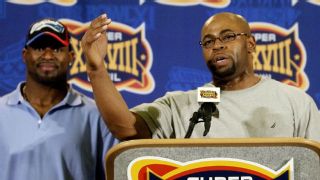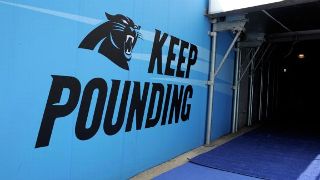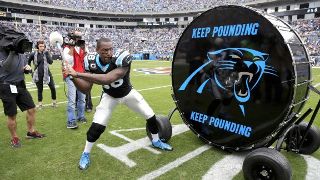|
CHARLOTTE, N.C. -- It was a cold, overcast Friday in January 2004 when coach John Fox gathered the Carolina Panthers on the far practice field near Bank of America Stadium. In 24 hours, the team would begin its fairy-tale run to Super Bowl XXXVIII with a wild-card playoff game against the Dallas Cowboys. Sam Mills wanted to speak. So players went to one knee and gathered tightly around their linebackers coach, with the skyline of Charlotte as his backdrop. Mills began sharing his story of how a 5-foot-9 middle linebacker that no NFL team wanted coming out of Montclair State went on to become a five-time Pro Bowl player after a three-year stint in the United States Football League. He spoke of how doctors diagnosed him with intestinal cancer hours before he showed up to coach the linebackers in the 2003 preseason finale and that he was given only three months to live. He told the Panthers that they became his inspiration to fight the tough days of chemotherapy treatments when, on Sept. 14 of that season, they blocked an extra point on the final play of regulation to send a sure loss against Tampa Bay into overtime, where they won. He told them, in his powerful but soft-spoken voice, to keep pounding. "When I found out I had cancer, there were two things I could do: quit or keep pounding," Mills said that day. "I'm a fighter. I kept pounding. You're fighters, too. Keep pounding!" Mills died on April 18, 2005, at age 45. His legacy lives on as the Panthers prepare to face the Denver Broncos on Feb. 7 in Super Bowl 50. None of the current Carolina players knew Mills, but they are reminded of his message each day when they walk into the weight room and see the "Keep Pounding" tribute. They are reminded of it before every home game when somebody bangs the "Keep Pounding" drum on the edge of the field. They are reminded of it by the statue of Mills, the only player in team history honored this way, outside Bank of America Stadium. They are reminded of it when they put on their uniform and see "Keep Pounding" inscribed on the inside collar. "A young man stricken early in his life with a terrible disease, and still to be able to look at it and tell people you've got to keep fighting," Panthers coach Ron Rivera said last week. "Our guys are learning and understand what it truly does mean beyond a football game."  Quarterback Jake Delhomme was feeling down as he made the short walk from the stadium to the practice field. The Panthers were in the midst of a three-game losing streak after an 8-2 start to the 2003 season. Delhomme was tired and sore from the beating he had taken three days earlier. Quarterback Jake Delhomme was feeling down as he made the short walk from the stadium to the practice field. The Panthers were in the midst of a three-game losing streak after an 8-2 start to the 2003 season. Delhomme was tired and sore from the beating he had taken three days earlier.
Then he felt a breeze as somebody ran past. He heard, "All right, big Jake!" in a familiar voice. "Sam was going out there to do his hundred-yard sprints before practice," Delhomme recalled. "I was, 'Here I am walking, feeling sorry for myself because we lost a couple in a row, body feeling a little sore, and I just got passed by a guy who is dying of cancer.' "It was an 'aha' moment for me. Like, 'You need to grow up and be a big boy.' He was an example. I wanted to be a tenth like Sam." That's the story Delhomme tells when he thinks of Mills. The "keep pounding" speech had an impact, but Mills' actions were more powerful. One of the original Panthers in 1995, coming as a free agent from New Orleans, Mills quickly became the standard to which team owner Jerry Richardson held everyone. Mills was a gentleman and a warrior. He also made big plays. None was more memorable than his 1995 interception of a New York Jets shovel pass that he returned for a touchdown, sparking the Panthers to their first win after an 0-5 start. "His actions spoke so loudly about how he addressed being a player, how he addressed being a personnel guy and being a coach," former Carolina general manager Marty Hurney said. "His personality is one that just commanded respect. At the same time, he could make you laugh. He made me laugh more than anyone I knew." On that cold day in January 2004, Mills made grown men cry. "It was an emotional day," said Mills' son, Sam Mills III, currently an assistant defensive line coach with the Panthers, who was on the field that day. "He just wanted to share his journey with the team, share his thoughts. "He was a very passionate guy on the field. That was his way, along with coaching, to contribute to the team."  Those who were present for Mills' talk still get chills thinking about it. They equate it to the "Never give up" speech by former North Carolina State basketball coach Jim Valvano at the 1993 ESPYs. Those who were present for Mills' talk still get chills thinking about it. They equate it to the "Never give up" speech by former North Carolina State basketball coach Jim Valvano at the 1993 ESPYs.
"It was unbelievable," said Ricky Proehl, who played for the Panthers from 2003 to 2005 and is now their wide receivers coach. "The hair on the back of your neck stood up." "It was straight from the heart," former offensive lineman Kevin Donnalley recalled. Jordan Gross, a rookie tackle that season, said it was delivered matter-of-factly, yet powerfully. "The delivery was almost like an assignment, like, 'When things are bad, keep pounding. When it seems all hope is lost, keep pounding,'" Gross said. "It was more like a message delivered than a command." The Panthers beat the Cowboys 29-10 the next day. The next week they survived a 29-23 double-overtime thriller in St. Louis that ended with Steve Smith catching a 69-yard, walk-off touchdown pass. The next week they beat Philadelphia 14-3 in the NFC Championship Game. Then came the Super Bowl. On the Thursday before the game, after another round of chemotherapy, Mills flew to Houston to be with the team. At a news conference with linebacker Mark Fields, who was diagnosed with Hodgkin's disease in training camp, Mills was noticeably weak. Sweating as he held on to the podium, he smiled and said, "You have your good days and your bad days. I'm just glad I am having days, you know?" Carolina's run finally ended in the Super Bowl when New England kicked a last-second field goal to win 32-29. But Mills' message didn't end. If anything, it has grown stronger since Rivera became the coach in 2011. He revitalized the use of the "Keep Pounding" drum to the point it has become an event. Among those to bang the drum: NBA MVP Stephen Curry; Braylon Beam, a 6-year-old whose fight against cancer has earned national attention; former players such as Delhomme; and current players, including as outside linebacker Thomas Davis. It never was a bigger symbol than it was last weekend, before the NFC Championship Game against Arizona. Richardson, who had a heart transplant in 2009, swung the oversize drumstick like he was 29 instead of 79. "I was up in the coaches' booth tearing up, me and a bunch of other guys up there," Mills III said. "It was very emotional."  Backup linebacker A.J. Klein has the locker that Mills used as a player, in the far corner of the locker room. He didn't know what "keep pounding" really meant until head trainer Ryan Vermillion shared Mills' story last year. Backup linebacker A.J. Klein has the locker that Mills used as a player, in the far corner of the locker room. He didn't know what "keep pounding" really meant until head trainer Ryan Vermillion shared Mills' story last year.
"He gave the whole story, how Sam poured out his heart, how much the organization, football meant to him," Klein recalled. "Right then and there I finally understood what it meant to keep pounding. I wish I could have met him." Davis epitomizes Mills' message. In 2012, he became the first player in NFL history to successfully return from three ACL surgeries on the same knee. He's preparing to play in the Super Bowl two weeks after suffering a broken forearm in the NFC title game. "I'll live the rest of my life by that mantra," Davis said. Quarterback Cam Newton calls "keep pounding" a way of life. "It's not necessarily two words that hang inside our jerseys, that you often see walking around this organization," he said. "It's a resilient attitude that we'll refuse to settle." Mills never settled. He fought to the very end. And on a cold day in January 2004, he shared a message that resonates today. "That's where it all started," Proehl said. "Just keep pounding. Don't quit. No matter what the situation is, no matter what the odds are, just keep pounding."
|
